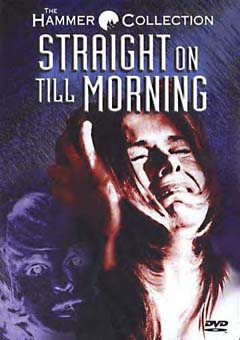 STRAIGHT
ON TILL MORNING (1972)
STRAIGHT
ON TILL MORNING (1972)Director: Peter Collinson
Anchor Bay Entertainment
 STRAIGHT
ON TILL MORNING (1972)
STRAIGHT
ON TILL MORNING (1972)During the 60s, Hammer Films produced a string of trendy psychological thrillers starring the likes of Bette Davis, Tallulah Bankhead, Susan Strasberg and Stephanie Powers. By the early 70s, Hammer was still toying with ideas in this arena, and the next actress employed was Rita Tushingham (A TASTE OF HONEY, THE KNACK), one of the most endearing and talented British stars to arrive on the screen in the 60s. John Peacock's unusual script was written specifically for Tushingham.
Continuing a series of performances
that would be dubbed "ugly duckling" roles, Tushingham is Brenda,
a dreary and naive plain Jane who decides to leave her mum in London and head
to swinging London to find a man to bear her child. She takes a job at a mod
Carnaby Street boutique and boards with a beautiful, promiscuous thing named
Caroline (Katya Wyeth, Mircalla in Hammer's TWINS OF EVIL). Discovering that
she's too square for the scene and that Caroline is too much competition for
the men that she fancies, Brenda kidnaps a dog in order to meet up with its
male owner.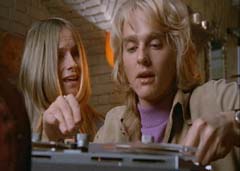
After prettying up the animal, she returns it to the owner, Peter (Shane Briant) a handsome golden-locked young man who lives quietly by himself. She confesses her reason for scheming the snatching of the dog and the two start sort of a relationship. Brenda moves in, tidies things up, and forms a romantic bond with him, finally thinking she met the man of her dreams. But things aren't as dandy as they seem: Peter is actually a psychotic lady-killer who has a negative connotation towards all things beautiful.
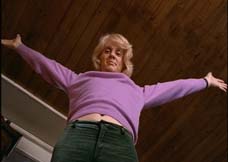 Although
director Peter Collinson's previous thriller FRIGHT provided conventional scare
tactics and in-your-face blows, STRAIGHT ON TILL MORNING takes on a rather ambiguous
approach to the proceedings. The film uses sometimes confusing, erratic cross-cutting
editing throughout, and we never see anything too graphic, nor do we see what
becomes of the victims' bodies. Tushingham's character is painfully pathetic
and easily mislead, while Briant's is cold, dismal and frightfully unpredictable.
With this in mind, watching their scenes together can be an uneasy experience.
Although
director Peter Collinson's previous thriller FRIGHT provided conventional scare
tactics and in-your-face blows, STRAIGHT ON TILL MORNING takes on a rather ambiguous
approach to the proceedings. The film uses sometimes confusing, erratic cross-cutting
editing throughout, and we never see anything too graphic, nor do we see what
becomes of the victims' bodies. Tushingham's character is painfully pathetic
and easily mislead, while Briant's is cold, dismal and frightfully unpredictable.
With this in mind, watching their scenes together can be an uneasy experience.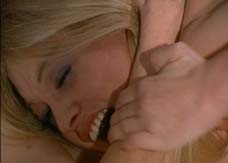
With nothing gratuitous whatsoever, STRAIGHT ON TILL MORNING manages to have two of the most disturbing scenes in any Hammer film: Peter's Stanley knife slaying of his "beautified" dog (for which I was agonizing the thought of witnessing again) and the traumatic ending, which involves the tape-recorded screams of various victims (recalling the movie camera from PEEPING TOM). Peacock's script plays like a fairy-tale gone mad, in this case "Peter Pan" ("Peter" renames Brenda as "Wendy" and his dog is named "Tinker," and the title is a line from "Peter Pan") and the viewer will either find it all dull and unrewarding or intense and haunting, depending on how one looks at cinema.
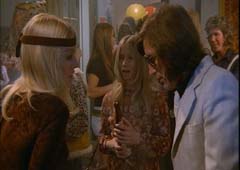 STRAIGHT
ON TILL MORNING was given a brief theatrical release in the U.S. and later became
a staple of late-night television. On home video, it was released by a small
label under the title, "Till Dawn Do Us Part." Destined for obscurity,
Anchor Bay has rescued another Hammer film and given it deluxe treatment on
DVD. It's Anamorphic and although the packaging denotes a 1.66:1 aspect ratio,
it actually appears closer to 1.78:1 or 1.85:1. This framing looks suitable,
as Brian Probyn's cinematography is comprised of mostly tight close-ups. The
original Eastmancolor photography has never looked better (from the psychedelic
partying in London, to the drab essence of Peter's flat), and the print source
is free of any blemishes. The Dolby mono soundtrack is solid and clear of any
noticeable imperfections.
STRAIGHT
ON TILL MORNING was given a brief theatrical release in the U.S. and later became
a staple of late-night television. On home video, it was released by a small
label under the title, "Till Dawn Do Us Part." Destined for obscurity,
Anchor Bay has rescued another Hammer film and given it deluxe treatment on
DVD. It's Anamorphic and although the packaging denotes a 1.66:1 aspect ratio,
it actually appears closer to 1.78:1 or 1.85:1. This framing looks suitable,
as Brian Probyn's cinematography is comprised of mostly tight close-ups. The
original Eastmancolor photography has never looked better (from the psychedelic
partying in London, to the drab essence of Peter's flat), and the print source
is free of any blemishes. The Dolby mono soundtrack is solid and clear of any
noticeable imperfections.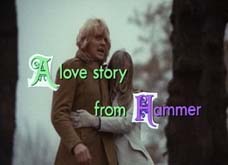
Included on a separate audio track is a commentary with Rita Tushingham moderated by Jonathan Sothcott. Although the insight of the late Peter Collinson is of course absent, Sothcott aptly fills in all the gaps about the various cast members and what Collinson's and Hammer's intents were with this project. Tushingham doesn't seem too happy with the film or her performance (especially the scene where Brenda dolls herself up with a ridiculous wig and clownish make-up) but she still has a lot of notable things to say and seems to have a great sense of humor. Not surprisingly, both participants loathed the dog killing scene as much as this reviewer, but I have to keep telling myself, "It's only a movie!"
Also included is the British theatrical
trailer (oddly hyping the film as "A love story from Hammer"), a biography
on Collinson by Mark Wickum and liner notes by Sothcott. Not only does Sothcott
essay a thoughtful analysis of the film and of Collinson's talent, but he also
gives an astute compliment to Michael Carreras, the Hammer-head who is often
blamed for the company's demise: "...a rebellious, gifted filmmaker who
was never happy with the company's reliance on Dracula and Frankenstein."
Nicely said. (George R. Reis)